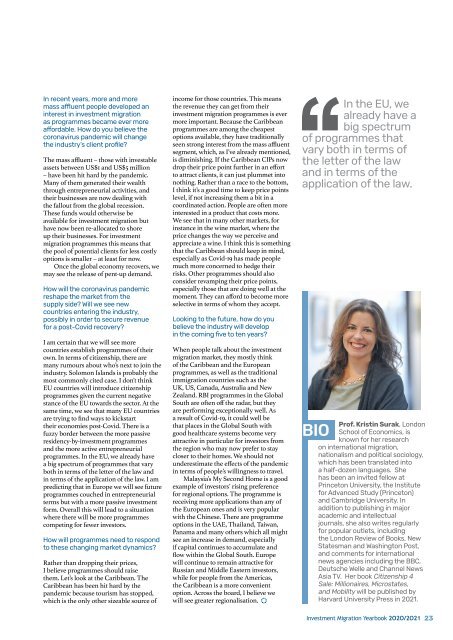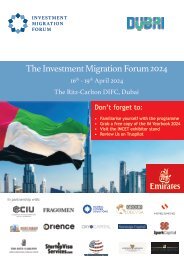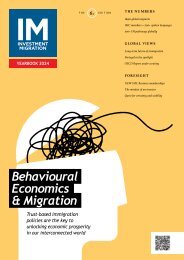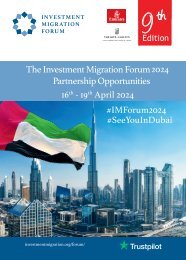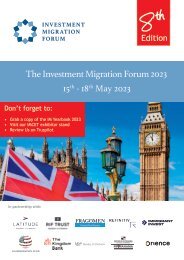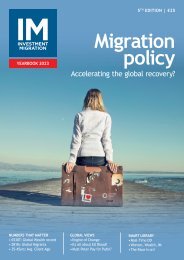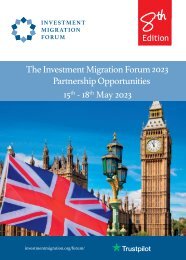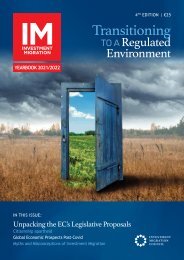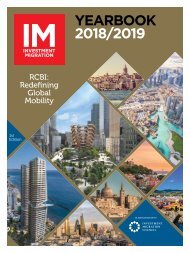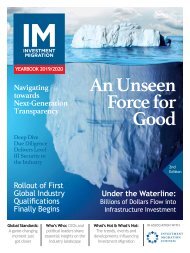IM Yearbook 2020/21
Born from the need for a global, credible, “go-to” publication, the 3rd IM Yearbook offers valuable access to a prime target audience of top industry influencers, decision makers, and the foremost referral network to the world’s most influential Investment Migration programmes: Government officials such as Heads of CIU’s, policy makers, academics, migration agents, law firms, wealth managers, financial advisors, real estate developers, and international firms involved in investment migration.
Born from the need for a global, credible, “go-to” publication, the 3rd IM Yearbook offers valuable access to a prime target audience of top industry influencers, decision makers, and the foremost referral network to the world’s most influential Investment Migration programmes: Government officials such as Heads of CIU’s, policy makers, academics, migration agents, law firms, wealth managers, financial advisors, real estate developers, and international firms involved in investment migration.
You also want an ePaper? Increase the reach of your titles
YUMPU automatically turns print PDFs into web optimized ePapers that Google loves.
In recent years, more and more<br />
mass affluent people developed an<br />
interest in investment migration<br />
as programmes became ever more<br />
affordable. How do you believe the<br />
coronavirus pandemic will change<br />
the industry’s client profile?<br />
The mass affluent – those with investable<br />
assets between US$1 and US$5 million<br />
– have been hit hard by the pandemic.<br />
Many of them generated their wealth<br />
through entrepreneurial activities, and<br />
their businesses are now dealing with<br />
the fallout from the global recession.<br />
These funds would otherwise be<br />
available for investment migration but<br />
have now been re-allocated to shore<br />
up their businesses. For investment<br />
migration programmes this means that<br />
the pool of potential clients for less costly<br />
options is smaller – at least for now.<br />
Once the global economy recovers, we<br />
may see the release of pent-up demand.<br />
How will the coronavirus pandemic<br />
reshape the market from the<br />
supply side? Will we see new<br />
countries entering the industry,<br />
possibly in order to secure revenue<br />
for a post-Covid recovery?<br />
I am certain that we will see more<br />
countries establish programmes of their<br />
own. In terms of citizenship, there are<br />
many rumours about who’s next to join the<br />
industry. Solomon Islands is probably the<br />
most commonly cited case. I don’t think<br />
EU countries will introduce citizenship<br />
programmes given the current negative<br />
stance of the EU towards the sector. At the<br />
same time, we see that many EU countries<br />
are trying to find ways to kickstart<br />
their economies post-Covid. There is a<br />
fuzzy border between the more passive<br />
residency-by-investment programmes<br />
and the more active entrepreneurial<br />
programmes. In the EU, we already have<br />
a big spectrum of programmes that vary<br />
both in terms of the letter of the law and<br />
in terms of the application of the law. I am<br />
predicting that in Europe we will see future<br />
programmes couched in entrepreneurial<br />
terms but with a more passive investment<br />
form. Overall this will lead to a situation<br />
where there will be more programmes<br />
competing for fewer investors.<br />
How will programmes need to respond<br />
to these changing market dynamics?<br />
Rather than dropping their prices,<br />
I believe programmes should raise<br />
them. Let’s look at the Caribbean. The<br />
Caribbean has been hit hard by the<br />
pandemic because tourism has stopped,<br />
which is the only other sizeable source of<br />
income for those countries. This means<br />
the revenue they can get from their<br />
investment migration programmes is ever<br />
more important. Because the Caribbean<br />
programmes are among the cheapest<br />
options available, they have traditionally<br />
seen strong interest from the mass affluent<br />
segment, which, as I’ve already mentioned,<br />
is diminishing. If the Caribbean CIPs now<br />
drop their price point further in an effort<br />
to attract clients, it can just plummet into<br />
nothing. Rather than a race to the bottom,<br />
I think it’s a good time to keep price points<br />
level, if not increasing them a bit in a<br />
coordinated action. People are often more<br />
interested in a product that costs more.<br />
We see that in many other markets, for<br />
instance in the wine market, where the<br />
price changes the way we perceive and<br />
appreciate a wine. I think this is something<br />
that the Caribbean should keep in mind,<br />
especially as Covid-19 has made people<br />
much more concerned to hedge their<br />
risks. Other programmes should also<br />
consider revamping their price points,<br />
especially those that are doing well at the<br />
moment. They can afford to become more<br />
selective in terms of whom they accept.<br />
Looking to the future, how do you<br />
believe the industry will develop<br />
in the coming five to ten years?<br />
When people talk about the investment<br />
migration market, they mostly think<br />
of the Caribbean and the European<br />
programmes, as well as the traditional<br />
immigration countries such as the<br />
UK, US, Canada, Australia and New<br />
Zealand. RBI programmes in the Global<br />
South are often off the radar, but they<br />
are performing exceptionally well. As<br />
a result of Covid-19, it could well be<br />
that places in the Global South with<br />
good healthcare systems become very<br />
attractive in particular for investors from<br />
the region who may now prefer to stay<br />
closer to their homes. We should not<br />
underestimate the effects of the pandemic<br />
in terms of people’s willingness to travel.<br />
Malaysia’s My Second Home is a good<br />
example of investors’ rising preference<br />
for regional options. The programme is<br />
receiving more applications than any of<br />
the European ones and is very popular<br />
with the Chinese. There are programme<br />
options in the UAE, Thailand, Taiwan,<br />
Panama and many others which all might<br />
see an increase in demand, especially<br />
if capital continues to accumulate and<br />
flow within the Global South. Europe<br />
will continue to remain attractive for<br />
Russian and Middle Eastern investors,<br />
while for people from the Americas,<br />
the Caribbean is a more convenient<br />
option. Across the board, I believe we<br />
will see greater regionalisation.<br />
In the EU, we<br />
already have a<br />
big spectrum<br />
of programmes that<br />
vary both in terms of<br />
the letter of the law<br />
and in terms of the<br />
application of the law.<br />
Prof. Kristin Surak, London<br />
BIO School of Economics, is<br />
known for her research<br />
on international migration,<br />
nationalism and political sociology,<br />
which has been translated into<br />
a half-dozen languages. She<br />
has been an invited fellow at<br />
Princeton University, the Institute<br />
for Advanced Study (Princeton)<br />
and Cambridge University. In<br />
addition to publishing in major<br />
academic and intellectual<br />
journals, she also writes regularly<br />
for popular outlets, including<br />
the London Review of Books, New<br />
Statesman and Washington Post,<br />
and comments for international<br />
news agencies including the BBC,<br />
Deutsche Welle and Channel News<br />
Asia TV. Her book Citizenship 4<br />
Sale: Millionaires, Microstates,<br />
and Mobility will be published by<br />
Harvard University Press in 20<strong>21</strong>.<br />
Investment Migration <strong>Yearbook</strong> 2O2O/2O<strong>21</strong> 23


